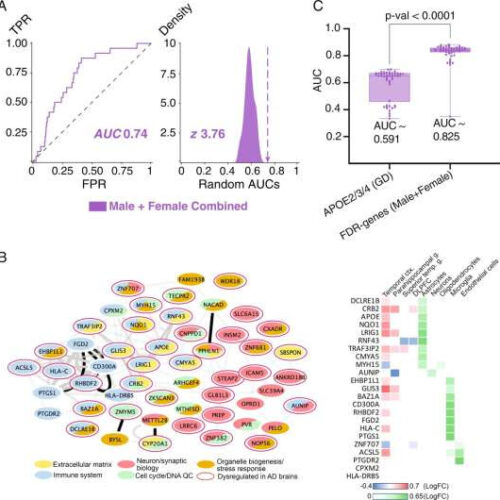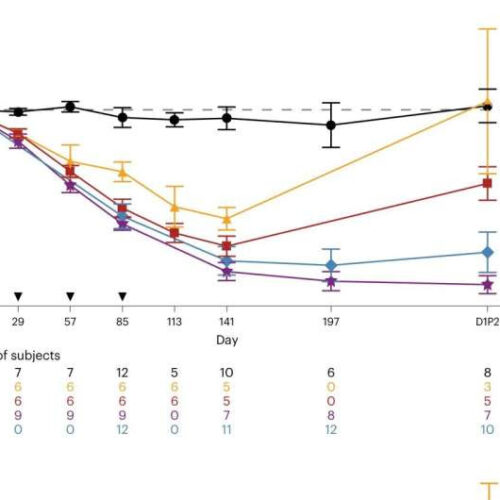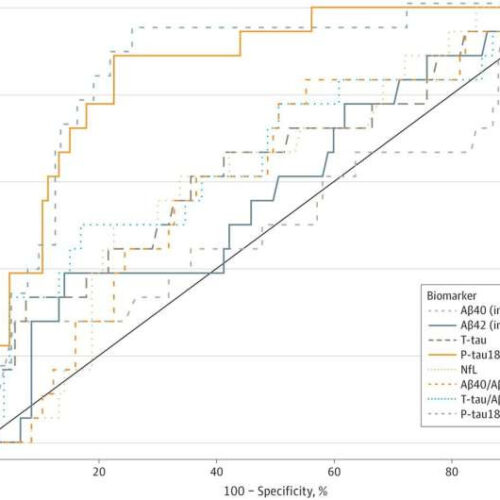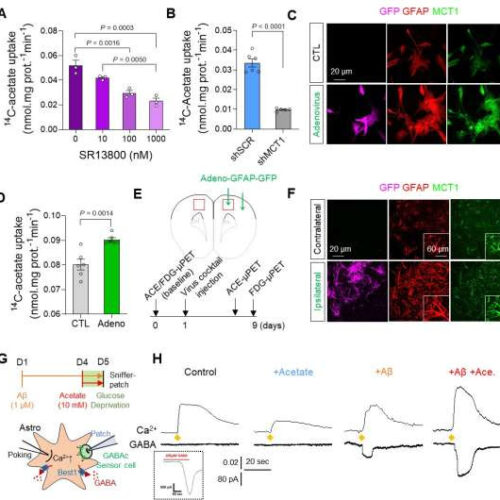by Texas Children’s Hospital The top 98 EAML genes are connected to GWAS genes, dysregulated in AD patients, and capable of separating AD and healthy control samples. Credit: Nature Communications (2023). DOI: 10.1038/s41467-023-38374-z Alzheimer’s disease (AD) is a complex neurodegenerative illness with genetic and environmental origins. Females experience faster cognitive decline and cerebral atrophy than males, while males...
Tag: <span>Alzheimer’s disease</span>
Gamma frequency tactile stimulation can reduce Alzheimer’s disease pathology and symptoms
Reviewed by Lily Ramsey, LLM May 18 2023 Evidence that non-invasive sensory stimulation of 40 Hz gamma frequency brain rhythms can reduce Alzheimer’s disease pathology and symptoms, already shown with light and sound by multiple research groups in mice and humans, now extends to tactile stimulation. A new study by MIT scientists shows that Alzheimer’s model mice...
A self-administered mobile app to detect Alzheimer’s disease using speech data
by University of Tsukuba Credit: Sergey Nivens/Shutterstock Alzheimer’s disease (AD) is the most common form of dementia. It is important to start intervention from an early stage, e.g., the mild cognitive impairment (MCI) stage, to prevent or delay the progression of AD. For the early detection of AD and MCI, there is a growing need to...
Inhaling menthol improves cognitive function in Alzheimer’s disease
Cima University of Navarra researchers show that smelling this substance modulates the immune system and improves cognition in animals with this neurodegenerative disease. This study opens the door to developing therapies based on stimulating and traini UNIVERSIDAD DE NAVARRA IMAGE: FROM LEFT TO RIGHT: CIMA UNIVERSITY OF NAVARRA RESEARCHERS MARÍA ALFARO, MARÍA ESPELOSÍN, MAR CUADRADO,...
First ‘gene silencing’ drug for Alzheimer’s disease shows promise
by University College London Effect of MAPTRx on CSF concentrations of p-tau protein and tau/Aβ42. a, The mean percentage change from baseline in p-tau over time according to dose group. b, The mean percentage change from baseline in the ratio of t-tau to Aβ42 over time according to dose group. Error bars indicate the standard error of...
Blood tests may help physicians in low-resource environments diagnose Alzheimer’s disease
by Columbia University Receiver Operator Curve Analyses of Plasma Biomarker Performance in Classifying Cerebrospinal Fluid (CSF)–Supported Diagnosis of Alzheimer Disease Performance of plasma biomarkers amyloid-β 1-40 (Aβ40) (inverse), amyloid-β 1-42 (Aβ42) (inverse), total tau (T-tau), neurofilament light chain (NfL), phosphorylated tau181 (P-tau181), and ratios of Aβ40/Aβ42, T-tau/Aβ42, and P-tau181/Aβ42 in classifying CSF biomarker (P-tau181/Aβ42)–supported diagnosis of...
A new breakthrough in Alzheimer’s disease research: Visualizing reactive astrocyte-neuron interaction
by Institute for Basic Science Fig. 1. Augmentation of acetate uptake, mediated by MCT1, facilitates Aβ-induced GABA release in reactive astrocyte. A. Blockade effect of MCT1 inhibitor on 14C-acetate uptake in primary cultured astrocytes. B. Blockade effect of MCT1 gene-silencing on 14C-acetate uptake in primary cultured astrocytes. C. Representative images displaying GFAP and MCT1 expressions in primary...
Blood-based markers may reveal Alzheimer’s disease ten years before symptoms show
by Karolinska Institutet Credit: CC0 Public Domain Alzheimer’s disease begins decades before the onset of any symptoms, such as memory loss. Consequently, early diagnosis increases the chances of slowing the disease down with drugs. A new study on an inherited form of the disease shows that a protein called GFAP is a possible biomarker for very...
Early menopause, later start to hormone therapy may increase risk of Alzheimer’s disease
by Mass General Brigham Credit: Pixabay/CC0 Public Domain Women are more likely than men to develop Alzheimer’s disease (AD), with women making up two-thirds of the population living with AD. A new study, led by Mass General Brigham researchers, sheds light on the relationship between the risk of Alzheimer’s disease and age of menopause and use...
Unraveling the Mystery of Eye Damage in Alzheimer’s Disease Patients
TOPICS: Alzheimer’s Brain Cedars-Sinai Medical Center Eyes By CEDARS-SINAI MEDICAL CENTER MARCH 26, 2023 Researchers at Cedars-Sinai have conducted the most comprehensive analysis of retinal changes in Alzheimer’s disease patients and their correlation with brain and cognitive changes. Published in the journal Acta Neuropathologica, this study is crucial for understanding the intricate effects of Alzheimer’s on the retina,...








